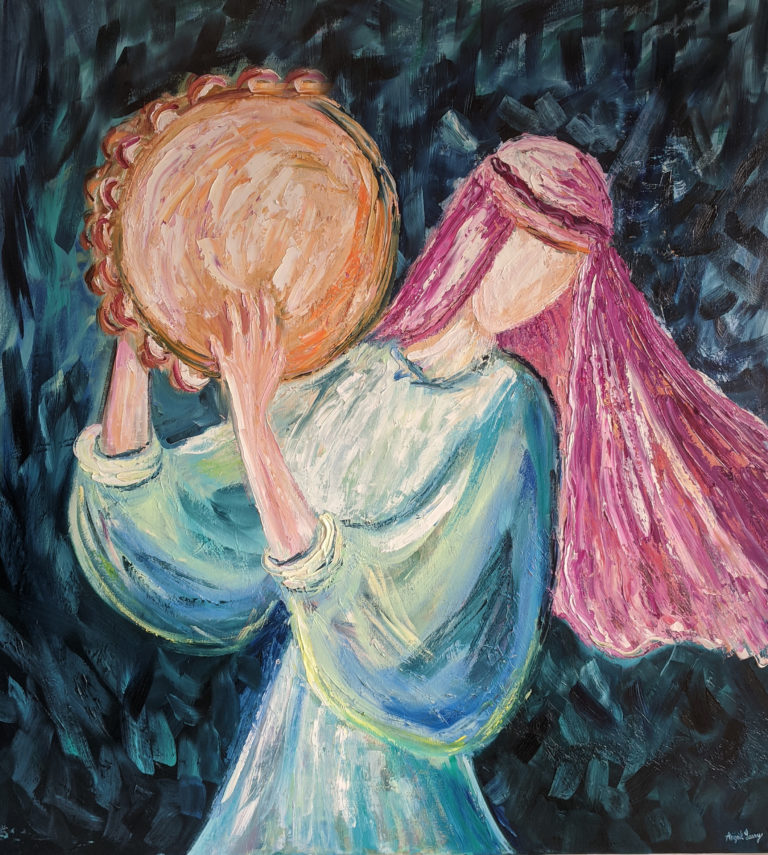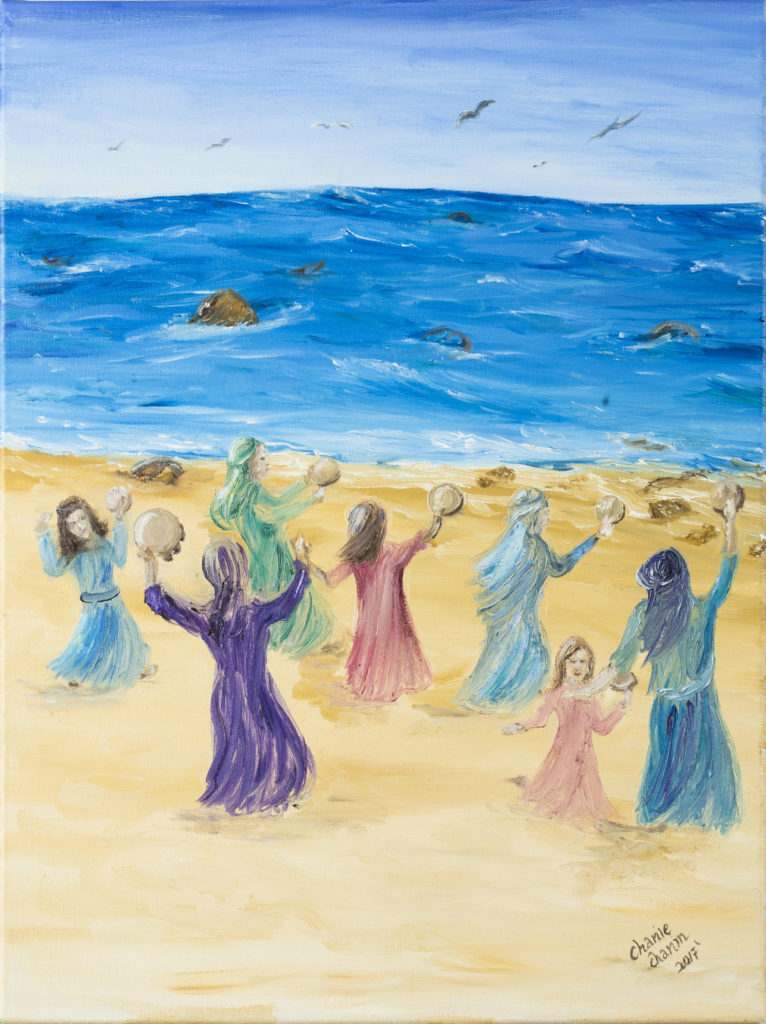
It’s a few days before Pesach, and I bet you can’t guess where I am spending many hours each day…
How did you guess?! Yes, it’s my small Pesach kitchen! There is so much to cook and prepare for the holiday. With many festive meals and, thank G-d, many mouths to feed, this is where I need to be right now.
It is a privilege to make Pesach. I keep telling myself this over and over, even as the exhaustion hits. Even as the overwhelm sets in. The to-do list is long. The only way to do it is to delegate. So one son is vacuuming the cars (I bribed him well), one daughter is making the desserts, my husband is setting up tables and schlepping boxes, and even the 5-year-old is peeling potatoes. Everyone is pitching in.
I’m trying to keep a joyous environment in the household, and music plays as we all work. But, truth be told, I’m stressed.
My husband walks into my little kitchen, takes out a hammer and nail, and hangs up a picture on the kitchen wall. It is a picture of one of my favorite Jewish women teachers and mentors, Rabbanit Yemima Mizrachi, and on the bottom of her picture he has typed the famous quote written in the Talmud: “It was in the merit of the holy Jewish women that we were redeemed from Egypt.”
After that quote, our sages went on to say that the future redemption will once again come through us, the women.
The word “emunah” has the root “eim”, which means “mother”. It has always been the women who have led with faith.
Jewish women are power. The strength of our faith is holding up our nation. We bring our passion, excitement, and hope for a bright future to the table. Emunah. Faith. The word “emunah” has the root “eim”, which means “mother”. It has always been the women who have led with faith.
The stories go back thousands of years. The Jewish nation has never had it easy throughout history. We have been enslaved, persecuted, humiliated, and killed…just for being Jews. When we think of those terrible times in Egypt where babies were made into bricks or thrown in the Nile River, with cruelty beyond imagination, it is hard to even fathom the devastation. The slavery in Egypt lasted nearly 200 years. The Egyptians enslaved us with the hardest backbreaking labor of both our bodies and our spirits.
The evil Pharaoh couldn’t handle how even though the Jews were enslaved and oppressed, we still stayed strong and held onto our faith and our beliefs. We carried on having children. And we were blessed and continued to be fruitful. At the time, the Jewish women were giving birth to six babies at once!
Pharaoh feared we were getting too powerful, and his astronomers saw in the stars that a boy was going to be born who would grow up to lead the Jews out of Egypt. Pharaoh decreed that all Jewish baby boys must be killed. Pharaoh told the Jewish midwives, Yocheved and Miriam, to kill all baby boys at birth. Yocheved and Miriam didn’t listen to Pharaoh’s decree. They did not fear him; they only feared G-d. They continued to take care of all the babies—both the boys and girls.
When Pharaoh called them back in and asked them why they were not following his orders, they bravely said that the Jewish women were so lively and so full of energy…When we come to assist in a birth, they have already delivered! When Pharaoh realized that he couldn’t rely on the midwives to do the job, he implemented other plans. He had his Egyptian guards throw all the baby boys into the Nile River.
Amram, Miriam’s father and a leader of the Jewish nation, couldn’t take the pain and suffering any longer. He decided to divorce his wife, Yocheved, in order to stop having children during this persecution. All the other Jewish men were sad, but they agreed that this was the right thing to do and divorced their wives as well.
Miriam was only a young girl at the time, but she knew she had to speak up. She said, “Father, your decree is even worse than Pharaoh’s decree! Pharaoh decreed against all baby boys, but your decree is against baby girls too! One day, G-d will take us out of this slavery. We need to ensure we have a nation for G-d to redeem.”
We are standing on the brink of the ultimate redemption. It will be we women, once again, who will lead the way.
It must have been very humbling to be put in his place like that, told off by his own child, but Amram accepted the rebuke. “The child is right,” he said. “We will continue to marry and bring children into the world. G-d will help. We must do our best, and the outcome is ultimately not in our hands, but in the hands of G-d.”
Amram remarried his wife, and everyone followed suit. Life carried on as usual, even with all the turmoil and hardships around them.
Miriam had known in her heart that her parents would be the ones to have that special child who would lead the Jewish people out of Egypt.
That same year, a baby boy was born to Amram and Yocheved. Their whole home was filled with a bright light which showed how special he was. Happily, Miriam’s father kissed her on her head. “My daughter,” he said, “your words are coming true!”
They hid the baby for 3 months, but eventually couldn’t hide him any longer. It was too dangerous. Miriam watched her mother make a small basket, and spread clay on the inside and sticky tar on the outside. Yocheved laid her precious baby inside the basket and took the basket to the river, putting it into the water. Miriam’s father, bitter and frustrated, said to his daughter, “Where is your prophecy now?!”

Miriam ran down to the Nile River and hid behind the bulrushes, never taking her eyes off of the basket with her baby brother inside. What would happen to her brother? She watched with complete and unwavering faith to see G-d unfold His miraculous plan.
Just then, she saw Pharaoh’s daughter, Batya, the princess of Egypt, coming down to the river with her maidservants. Batya saw the basket and stretched out her hand, and G-d made a miracle, and her arm stretched until she reached the basket. Batya drew the basket in from the water (hence, the baby was named “Moshe” from “Ki mein hamayim mishitihu—From the water I pulled him out”) and saw a beautiful baby boy crying inside. She knew that this must be a Jewish boy, and even though her father had decreed that all Jewish boys must be killed, her heart told her to protect him and keep him alive. She decided she would do whatever she could for this baby. She brought Egyptian wet nurses for him, but he refused to eat and continued to cry.
Miriam then emerged from behind the bulrushes, and boldly suggested to the princess that perhaps he would only nurse from a Jewish woman. She offered to run and call a Jewish mother to feed the child. Batya, holding the very unhappy baby, replied, “Yes! Please go quickly!”
And Miriam, filled with gratitude and happiness, ran home to call her mother. Batya then requested that Yocheved nurse the baby for 2 years in her own home before returning him to the palace. The princess offered to pay Yocheved for being the wet nurse…for this child…her very own child!
The Jewish women in Egypt pulled their men through difficult times. The men were depressed and exhausted, and I’m sure the women were as well. But the women drew strength from their wellspring of faith. The women used pieces of copper as mirrors to beautify themselves for their husbands. They would come to the fields to find their downtrodden husbands, and by loving them, they literally brought the men back to life. The women drew deeply upon their self-sacrifice and their womanly intuition, and stayed steadfast in their faith. These copper mirrors were so precious to G-d that they were later used in creating the vessel for purification which was at the entrance to the Mishkan.
——————————————————————————————————
The long-awaited day had come to leave Egypt. You can just imagine the stress and chaos of not knowing exactly what lay ahead. So much uncertainty, and of course, so much excitement!
If you got to grab a few things before moving on from your life to a new future, what would you grab?

The Jewish women grabbed their tambourines and musical instruments to sing and dance and praise G-d for His miraculous salvation. They had waited for this moment their entire lives. They had waited with so much faith. The moment had finally come, and the women were ready.
Since this time in Jewish history, the drum or tambourine has become the symbol of the Jewish women’s faith in the coming redemption. The Torah states how the prophetess Miriam and all the women danced with their musical instruments after the splitting of the sea. As it says in B’shalach, “And Miriam the prophetess, Aaron’s sister, took the drum in her hand, and all the women went out after her with drums and circle dances.”
And here we are today, women still leading with such faith, using so much sacrifice to keep our families strong. Holding on to our Judaism using herculean strength, as the culture around us makes it so difficult to stay true to our values and beliefs. So much has changed, and yet nothing has changed. We sometimes don’t realize how difficult our situation is. We’d rather not think about it. We are standing on the brink of the ultimate redemption. It will be we women, once again, who will lead the way. A kabbalist from the 16th century once said that the generation before the coming of Mashiach will be the reincarnated souls from the generation of Egypt.
It is time. We are ready. Bring it on!
Happy Pesach!